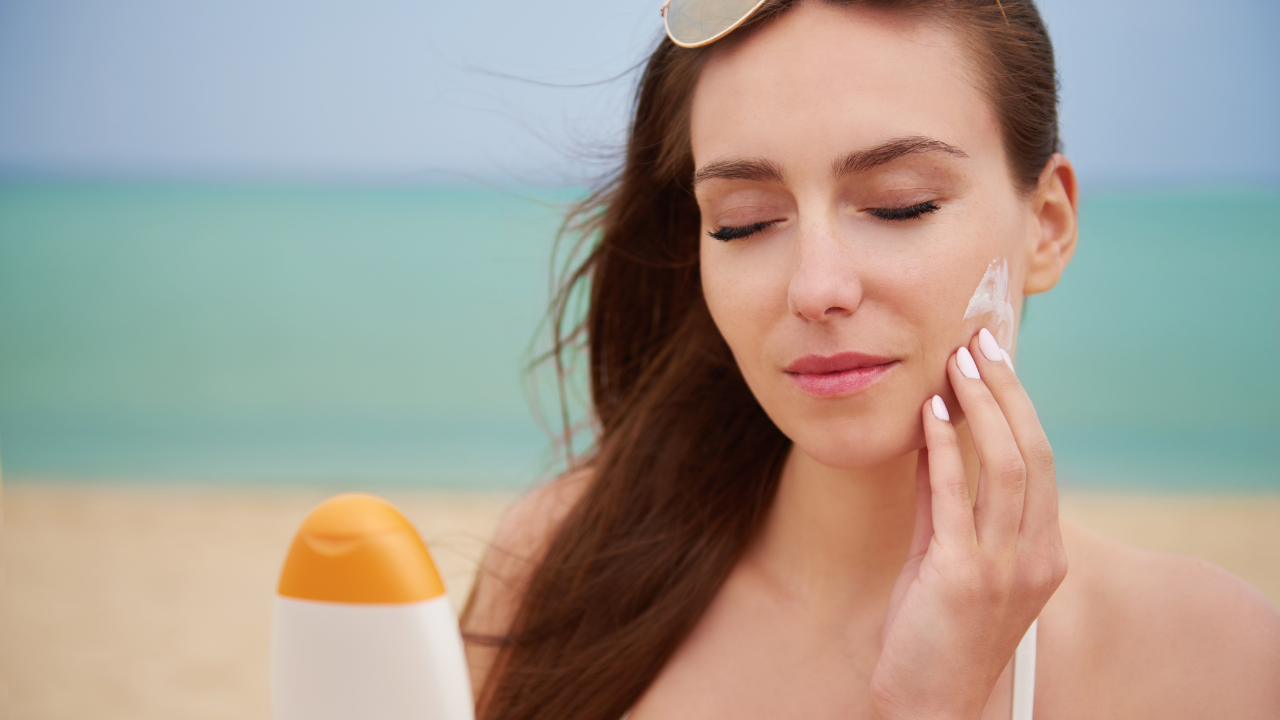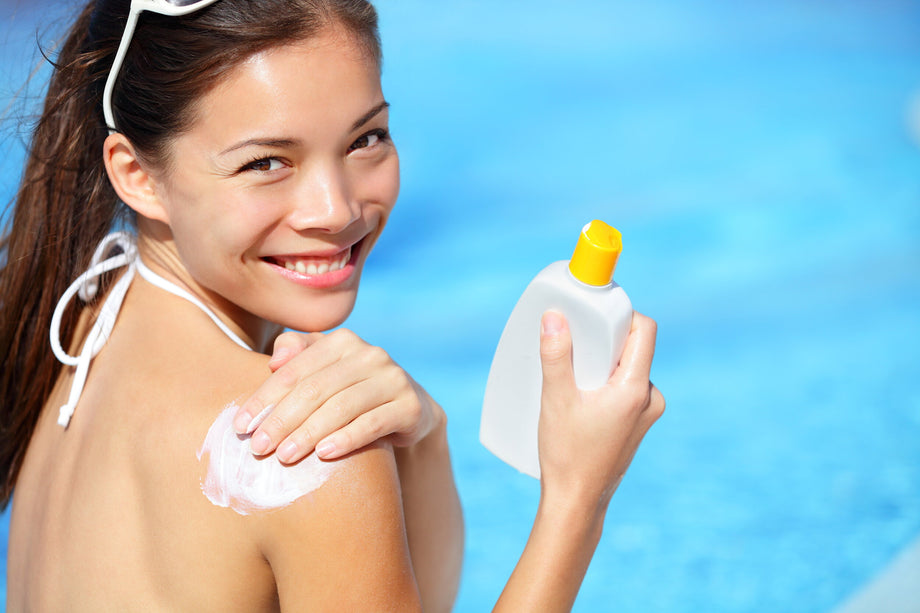The arrival of summer means beach days, grills, swimming pools, flip-flops, and lots of time spent in the sun! One of the nicest things about this season is spending time outdoors in the beautiful weather. However, you risk being burned and feeling uncomfortable while everyone else is having a good time if you don't protect your skin from the sun. In addition to the discomfort that a sunburn may bring right away, prolonged sun exposure can harm skin permanently.

The arrival of summer means beach days, grills, swimming pools, flip-flops, and lots of time spent in the sun! One of the nicest things about this season is spending time outdoors in the beautiful weather. However, you risk being burned and feeling uncomfortable while everyone else is having a good time if you don’t protect your skin from the sun. In addition to the discomfort that a sunburn may bring right away, prolonged sun exposure can harm skin permanently. This includes wrinkles, dark patches, and leathery skin. Additionally, it raises your risk of skin cancer, which is the most prevalent type of cancer worldwide, according to the American Cancer Society. In fact, by the time they are 70 years old, 1 in 5 Americans is predicted to get skin cancer.
So how can one avoid skin cancer, lessen damage to their skin, and prevent sunburn? Here are some pointers for keeping your skin safe both this summer and throughout the year:
1. Stay Out Of The Sun From 10:00 AM To 4:00 PM:

The sun’s beams are at their greatest during that time. Try to avoid the sun as much as you can during these peak hours, even if all you’re doing is walking the dog or running errands.
2. Wear Sunglasses:

Wear sunglasses to protect your eyes and the sensitive skin around them from the sun’s glare throughout the year. Although it might seem unnecessary to spend a little bit extra on sunglasses that block UV radiation, doing so actually benefits your skin. The finest types of sunglasses to protect the skin around your eyes are those with large frames.
3. Apply Sunscreen:
:max_bytes(150000):strip_icc()/how-to-apply-sunscreen-1-2000-d31a0e18f48f467b9578865471351c04.jpg)
Sunlight’s ultraviolet (UV) radiation can damage skin. Regardless of the weather—cloudy or sunny—it’s critical to shield your skin from UV radiation. Applying sunscreen is one approach to achieving this. Verify that the product is labeled “broad spectrum,” which indicates that it offers protection from UVA and UVB radiation. For optimal protection, choose sunscreens with an SPF of 30 or above. Additionally, remember to look up the expiration date! Use a lot of sunscreen, and reapply it if you’ve been sweating or swimming.
4. Wear A Hat:

By keeping the light off your face and shielding your eyes, a hat with a minimum 2- or 3-inch brim keeps the sun off of you. Think about wearing protective clothes on the remaining portions of your body as well. Unlike sunscreen, which ultimately wears off, this kind of clothing offers continuous coverage.
5. Avert The Tanning Bed:
The American Academy of Dermatology states that using an indoor tanning bed once in your lifetime can significantly raise your risk of acquiring skin cancer—by 20%. Using a self-tanning body lotion is recommended if you value having a sun-kissed look.
6. Examine Your Skin Frequently:

Conduct self-evaluations around once each month. Inform your physician if you have any of the following symptoms:
i. Fresh Spots
ii. Modifications To Current Spots
7. Avoid Sunbathing:

It’s never a good idea to purposefully expose yourself to the sun for a lengthy period of time, even if you’re using sunscreen. Staying under a tree or beach umbrella can provide you with much more shade and make you feel happier and cooler. Don’t forget to use sunscreen, though, as some of the sun’s UV rays can still reach you even in the shadow.
8. Also Guard Skin Against Other Kinds Of Burns:

Skin damage can result from more than just the sun. It is advisable for you to take precautions against unintentional burns. Following are a few instances:
i. To keep the steering wheel and car seat from getting too hot to the touch when parked in a sunny area, cover them.
ii. Put on flip-flops when strolling along the edge of the pool or crossing the beach’s heated sand.
iii. Use strong oven mitts to open the grill and turn the food, and stay away from scorching BBQ grills.
Moreover, it’s time to roll up your sleeves and take the appropriate precautions to protect yourself from the intense heat of the sun now that summer is finally displaying its real colors. Numerous skin and health problems arise throughout the summer months. The problem is that now is the time of year when you can finally show off your beach physique. And how can we go about fixing it Being mindful is the first rule. It is crucial to understand what is healthy for your body and what is not, as well as the signs of certain frequent summertime health problems. The second rule is to maintain good health and take care of your skin from the inside out. Finally, taking care of your body and skin externally is rule number three.
Skin-Healthy Summertime Foods To Consume:
Summer is a challenging time of year. It is the time of year when you can engage in the majority of outdoor activities, but it is also the time when your chances of being sick are at their highest. It is critical to provide your body with the necessary nutrients in sufficient amounts in order to strengthen your immune system and enhance your general health. Eating healthily and cleanly is also believed to give you a naturally youthful glow since it keeps all of your organ systems functioning at peak performance. Here are a few summertime foods that are good for your skin.
1. Coconut:

You may incorporate some extremely healthful options in your diet, such as coconut oil, coconut water, and smoothies. In addition to naturally hydrating the skin, coconut is believed to minimize fine lines and wrinkles. Moreover, it might aid in the restoration of the skin’s injured tissues.
2. Omega 3 Fatty Acids:
:max_bytes(150000):strip_icc()/GettyImages-1347857819-64e0b4dcbd314e828e4b40910ccfd08b.jpg)
Omega-3 fatty acids are abundant in flax seeds, chia seeds, walnuts, and salmon. These fatty acids are necessary for keeping skin, hair, and nails healthy. Regular intake of these preserves the suppleness and nourishment of the skin. Additionally, it has been shown to lessen itching and inflammation in cases of skin conditions like psoriasis and eczema.
3. Sweet Potatoes:

Since moisturizers can feel very heavy on the skin during the summer, sweet potatoes, which are high in Vitamin A, are quite useful in relieving dryness on the skin. Because of its low calorie content, it’s also a perfect substitute for regular potatoes.
4. Fresh Fruits And Vegetables:
:strip_icc()/difference-between-fruits-vegetables-01-5f92e7ec706b463287bcfb46985698f9.jpg)
Mix up your diet by consuming a range of seasonal fruits and vegetables. Try to avoid consuming smoothies or juices and instead eat the whole fruit. As a starter, you can experiment with several types of salads: Loaded with beta-carotene and the antioxidant lycopene, tomatoes are an excellent source. Vitamin C is also abundant in them. Tomato consumption may improve skin texture and fortify the skin’s defenses against sun damage.
5. Ginger:
:max_bytes(150000):strip_icc()/GettyImages-1205005642-a969673be5834a09a1aef83f1e4e7247.jpg)
Ginger contains a lot of zinc, a vitamin that helps regulate the hormones that cause the skin to produce oil. The suppleness of the skin is preserved, and acne is prevented by healthy oil production.
6. Green Tea:

The body’s dangerous free radicals can be slowed down by drinking organic green tea, which is high in antioxidants. Your skin will stay healthy and look radiant if you include green tea in your diet.
7. Green Leafy Vegetables:

Broccoli, kale, and lettuce are examples of green leafy vegetables that help prevent solar damage to the skin and slow down the aging process. They also help to keep the body hydrated because of their high water content.
8. Bell Peppers:
:max_bytes(150000):strip_icc()/Simply-Recipes-Bell-Pepper-Color-Price-LEAD-c5658676a6204bb38e2b58a92686f8d7.jpg)
Bell peppers enhance the blood flow to the skin in addition to adding beauty to salads. They might keep skin clear and healthy and lessen breakouts of acne.
4 Summer Skincare Tips To Take Care Of:
You can develop a few behaviors to prevent summertime skin problems. Let’s look at some strategies for maintaining good skin in the summer.
1. Stay Hydrated:

Consume copious amounts of water and other liquids, such as buttermilk, lemonade, and coconut water, to replenish the water lost via sweating.
2. Apply sunscreen:

Your skin has to be protected from the sun’s damaging UV rays by liberally applying sunscreen with a minimum SPF of 30 to all exposed areas of your body. At least fifteen to twenty minutes before going outside in the sun, apply sunscreen. Because sunscreen goes off over time, remember to reapply every two hours.
3. Avoid Too Much Sun:

As much as you can, try to avoid the sun’s harsh rays since too much exposure can result in skin cancer, rashes, and sunburns. When the sun is at its strongest, which is between 11 a.m. and 3 p.m., try to avoid it.
4. Wear Clothing Appropriate For The Season:

Cover up as much as you can and dress loosely in breathable materials.
During the summer, eating a diet rich in seasonal fruits and vegetables and using a summer-friendly skincare routine will keep your skin smooth and healthy. You can definitely show off that youthful glow by taking care of your skin, drinking plenty of water, and avoiding too much sun exposure!

